- Home
- Patricia Briggs
Silver Borne mt-5 Page 3
Silver Borne mt-5 Read online
Page 3
It was Friday night, and business was brisk. Happily, the service was fast.
After the waitress took our orders, Adam said, a little too casually, “So what did you see in your vision?”
“Nothing embarrassing,” I told him. “Just one time when I brought cookies over to you.”
His eyes brightened. “I see,” he said, and his shoulders relaxed a bit, even if his cheeks reddened. “I was thinking about that.”
“We okay?” I asked him. “I’m sorry I intruded.”
He shook his head. “No apologies necessary. You’re welcome to whatever you pick up.”
“So,” I said casually, “your first time was under the bleachers, huh?”
He jerked his head up.
“Gotcha. Warren told me.”
He smiled. “Cold and wet and miserable.”
The waitress plunked our food down in front of us and hurried on her way. Adam fed me bites of his rare filet mignon, and I fed him some of my salmon. Food was good, company better, and if I had been a cat, I’d have purred.
“You look happy.” He took a sip of his coffee and stretched out a leg so his foot was against mine.
“You make me happy,” I told him.
“You could be happy all the time,” he said, eating the last bite of baked potato, “and move in with me.”
To wake up next to him every morning . . . but . . . “Nope. I’ve caused you enough trouble,” I told him. “The pack and I need to come to . . . détente before I’m moving in. Your home is the den, the heart of the pack. They need a place where they feel safe.”
“They can adjust.”
“They’re adjusting as fast as they can,” I told him. “First there was Warren—did you hear that after you let him in, several other packs have allowed gay wolves to join, too? And now there’s me. A coyote in a werewolf pack—you have to admit that’s quite a lot of change for one pack to take.”
“Next thing you know,” he said, “women will have the vote or a black man will become president.” He looked serious, but there was humor in his voice.
“See?” I pointed my fork at him. “They’re all stuck in the eighteen hundreds, and you’re expecting them to change. Samuel likes to say that most werewolves have all the change they can deal with the first time they become wolf. Other kinds of change are tough to force on them.”
“Peter and Warren are the only ones who’ve been around since the eighteen hundreds,” Adam told me. “Most of them are younger than I am.”
The waitress came and blinked a little as Adam ordered three desserts—werewolves take a lot of food to keep themselves fueled up. I shook my head when she looked my way.
When she left, I took up the conversation from where I’d left off. “It won’t hurt us to wait a few months until things settle down.”
If he hadn’t basically agreed with me, I’d have been sleeping in his house already instead of making do with dates. He understood as well as I did that pulling me into his pack had caused a lot of resentment. Maybe if it had been a healthy, well-adjusted pack beforehand, things wouldn’t have gotten so tense.
A few years ago, some of his pack had started harassing me—a coyote living next door. Werewolves, like their natural brethren, are territorial, and they don’t share their hunting ground easily with other predators. So to put a stop to it, Adam declared me his mate. I hadn’t known at the time why the harassment abruptly stopped—and Adam hadn’t been in a hurry to tell me. But pack magic demanded that the declaration be answered, and Adam bore the cost when it wasn’t. It left him weaker, crabbier, and less able to help his pack stay calm, cool, and collected. By bringing me in as a member of his pack at virtually the same time our mating bond connected, Adam hadn’t given his people a chance to get their feet underneath them before throwing them back onto uncertain ground.
“One more month,” he said finally. “And then they—and Samuel, too—will just have to get used to it.” His eyes, the color of bitter dark chocolate, were serious as he leaned forward. “And you will marry me.”
I smiled, showing my teeth. “Don’t you mean, ‘Will you marry me?’ ”
I meant it to be funny, but his eyes brightened until little gold flecks were swimming in the darkness. “You had your chance to run, coyote. It’s too late now.” He smiled. “Your mother is happy that she’ll be able to use some of the stuff from your sister’s wedding that wasn’t.”
Panic swelled my heart. “You didn’t talk to her about this, did you?” I had visions of a church filled with people and white satin everywhere. And doves. My mother had had doves at her wedding. My sister had eloped to get away from her. My mother is a steamroller, and she doesn’t listen very well . . . to anyone.
The wolf left his eyes, and he grinned. “You’re okay with marrying a werewolf who has a teenage daughter and a pack that’s falling apart—and your mother panics you?”
“You’ve met my mother,” I said. “She ought to panic you, too.”
He laughed.
“You just weren’t around her long enough.” It was only fair that I warn him.
* * *
WE WERE LUCKY AND GOT OUR SCORING TABLE TO ourselves, as the women who had the lane to our left were packing up when we got back from choosing our bowling balls from the available stack. Mine was bright green with gold swirls. Adam’s was black.
“You have no imagination,” I told him smugly. “It wouldn’t hurt if you found a pink ball to bowl with.”
“All the pink balls have kid-sized holes in them,” he told me. “The black balls are the heaviest.”
I opened my mouth, but he shut me up with a kiss. “Not here,” he said. “Look next to us.”
We were being observed by a boy of about five and a toddler in a frilly pink dress.
I raised my nose in the air. “As if I were going to joke about your ball. How juvenile.”
He grinned at me. “I thought you’d feel that way.”
I sat down and messed with player names on the interface on the scoring table until I was satisfied.
“Found On Road Dead,” he said dryly, looking over my shoulder.
“I thought I’d use our cars as names. You drive a Ford now. F-O-R-D.”
“Very Woo-hoo?”
“Not a lot of cool words start with a ‘W,’ ” I admitted.
He leaned over my shoulder and changed it to “Vintage Wabbit,” then into my ear, he said, “Very wicked. Mine.”
“I can live with that.” His warm breath on my ear felt very wicked, all right.
Until Adam, I’d always felt like his black bowling ball—boring but useful. I’m nothing special in the looks department, once you get past the slightly exotic coloring my Blackfoot father gave me. And Adam . . . Heads turn when Adam walks by. Even in the bowling alley, he was attracting attention.
“Go throw your boring black ball,” I told him sternly. “Flirting with the scorekeeper won’t help you because the computers keep score now.”
“As if I needed help,” he smirked, walking backward a few steps before he turned around to pay attention to the poor, helpless bowling pins.
He bowled with the deadly earnestness and decisive style with which he did everything else. Controlled power, that was Adam.
But I started noticing something other than admiration in the gazes of the people who were beginning to look at us. At Adam. He wasn’t really a celebrity; he tried to stay out of the news. But Adam was one of the wolves who was out to the public—a sober, successful businessman whose security company protected American nuclear technology from foreign hands: a good guy who happened to be a werewolf. All fine and dandy when they read about it in the newspapers, I guess. But it was different to see a werewolf at their bowling alley.
They are afraid of him.
The thought was so strong it felt as if someone were whispering into my ear, bringing with it worry.
Look at them. I saw the men bristling over their women, the mothers hastily gathering their children to them. In
a moment, there would be a mass exodus—and that was assuming that some of the young men I saw coming to their feet about four lanes down didn’t do something stupid.
He hasn’t noticed yet.
Adam gave me a sly, pleased grin at his strike as he walked back—a strike more remarkable because there were no shattered pins, no broken equipment. Too much power can be as great a disadvantage as not enough.
Look beside you.
I took up my green ball and glanced at the people next to us. Like Adam, they were too involved in their game to notice the growing murmuring. The young boy was crawling under the chairs, and his parents were bickering over something on the score-board. Their too-cute toddler—with her pink dress and little pink lions in the two-inch ponytails that stuck out from the back of her head—had climbed up on the bowling platform and was playing with the ball return blowers designed to dry sweaty palms. She wiggled her little hands over the cool air and laughed.
Adam will feel bad when he notices that people are leaving because he’s here.
Sweat gathered on my forehead, which was ridiculous because it was cool inside. I paused halfway to the throw line (or whatever it was called) and, imitating Adam, I brought the ball up and held it in the middle of my chest.
Perhaps there’s a way to show everyone that he’s not a monster, he’s a hero.
I glanced over my shoulder and watched the toddler bang on the air vent. Her brother had wandered back through the seating area and was playing with the balls on the racks. His mother had just noticed he’d gotten away from her and had gotten up to go get him.
I turned my attention back to the pins.
“Are you watching?” I asked Adam. The urge to do something for Adam was so strong it made my hands clench.
“My eyes are peeled,” he said. “Are you going to do something amazing?”
I swung the ball awkwardly, as if I’d never bowled before, missed the release, and sent it zipping backward toward the little girl playing with the air.
As soon as it left my fingers, I couldn’t believe what I’d done. Sweating, shaking, and horrified, I turned. But as quick as I was, I’d missed the action.
Adam had caught the ball a good two feet short of the toddler.
She looked up at Adam, whose noisy fall to the ground had disturbed her play. When she saw that there was a strange man so close, her eyes got big, and her bottom lip stuck out.
Adam is mostly uninterested in children (other than his own) until they are teenagers or older and, as he told me once, capable of interesting conversation.
“Hey,” he said, looking very uncomfortable.
She considered him a moment. But she was female and Adam was . . . well, Adam. So she put her hands in front of her mouth and giggled.
It was adorable. Darling cute. He was a goner, and everyone who was watching could see it.
The miniature conqueror squealed as her father grabbed her up and her mother, little boy in tow behind her, babbled out thanks.
And you are the villain of the piece. Poor Mercy.
Of course I was the bad guy; I’d nearly smooshed a toddler. What had I been thinking? If she’d taken a step back, or if Adam hadn’t been fast enough, she could have been killed.
She wasn’t in any danger. You didn’t throw it at her, just rolled it past her. It wouldn’t have hit her. You saved him, and he didn’t even notice.
He frowned at me after we moved over a lane (for the safety of everyone, though the anxious manager didn’t actually come out and say that). We restarted the game, and he let me bowl first.
I carefully rolled the first ball down the gutter, where it wouldn’t be likely to hit anyone. I don’t know if I did it for my own sake or to reassure anyone watching me.
All you were trying to do was keep Adam happy. And this is the thanks you get.
Almost squishing babies wasn’t exactly an act I expected thanks for. I rubbed my forehead as if it would help clear my thoughts.
It wouldn’t have hit her. You made sure of it. Even if Adam had missed, it would have rolled harmlessly past.
Adam watched me thoughtfully, but he didn’t say anything to me as I engineered my loss by a hundred bazillion points. I could hardly bowl well after my spectacular failure, or someone would figure out I’d done it on purpose.
I had done it on purpose, hadn’t I?
I couldn’t believe I’d done something like that. What was wrong with me? If Adam had looked more approachable, I might have talked to him about it.
He doesn’t want to hear what you have to say. Best just keep quiet. He’d never understand anyway.
I didn’t mind, didn’t object anyhow, to the way Adam made sure to stand where he could field my ball if I lost control again. After all, his rescue of the baby looked better if he seemed to think I was an idiot, right?
Four turns in, Adam stepped in front of me, and said in a low voice that wouldn’t carry beyond us, “You did it on purpose, didn’t you? What in the hell were you thinking?”
And for some reason, even though I agreed with him, his question made me mad. Or maybe that was the voice in my head.
He should have understood sooner. He should understand his mate better than anyone. You shouldn’t have to defend yourself to him. Best not to say anything at all.
I raised an eyebrow and stalked past him to pick up my ball. Hurt fed anger. I was so mad I forgot myself enough to get a strike. I made sure it was the last point I made in the game—and I didn’t say a word to him.
Adam won with a score over two hundred. When he finished bowling the last frame, he took both our balls back to the rack while I changed my shoes.
The teenage boys (by then five lanes away) stopped him and had him sign an autograph for them. I took my shoes back to the desk and turned them in—and paid for the game, too.
“Is he really the Alpha?” asked the teenage girl behind the counter.
“Yep,” I said through clenched lips.
“Wow.”
“Yep.”
I left the bowling alley and waited for him by the side of his shiny new truck, which was locked. The temperature had dropped by twenty degrees as soon as the sun went down, and it was cold enough to make me, in my heels and dress, uncomfortable. Or it would have been if my temper hadn’t kept me nice and warm.
I stood by the passenger door, and he didn’t see me at first. I saw him lift his head and sniff the air. I leaned my hip against the side of the truck, and the movement caught his attention. He kept his eyes on me as he walked from the building to the truck.
He’d thought you’d deliberately endanger a child to make him look good. He doesn’t understand that you’d never do such a thing. She wouldn’t have gotten hurt; the ball would have rolled past her harmlessly. He owes you an apology.
I didn’t say anything to him. I could hardly tell him that the little voices made me do it, could I?
His eyes narrowed, but he kept his mouth shut, too. He popped the locks and let me get myself in the truck. I paid attention to the buckle, then settled back in the seat and closed my eyes. My hands clenched in my lap, then loosened as a familiar shape inserted itself and my hands closed on the old wood and silver of the fae-made walking stick.
I’d gotten so used to its showing up unexpectedly, I wasn’t even surprised, though this was the first time I’d actually felt it appear where it hadn’t been. I was more preoccupied with the disaster of our date.
With the walking stick in my hands, it felt as if my head cleared at last. Abruptly I wasn’t angry anymore. I was just tired and I wanted to go home.
“Mercy.”
Adam was angry enough for the both of us: I could hear the grinding of his teeth. He thought I would throw a bowling ball at a little girl.
I couldn’t blame him for his anger. I moved the walking stick until the base was on the floor, then rubbed my thumb on the silver head. There was nothing I could say to defend myself—I didn’t want to defend myself. I’d been recklessly stupid. What
if Adam had been slower? I felt sick.
“I don’t understand women,” he bit out, starting the car up and gunning the gas a little harder than necessary.
I gripped the fairy stick with all my might and kept my eyes closed all the way home. My stomach hurt. He was right to be angry, right to be upset.
I had the desperate feeling something was wrong, wrong, wrong. I couldn’t talk to him because I was afraid I’d make everything worse. I needed to understand why I’d done what I’d done before I could make him understand.
We pulled into my driveway in silence. Samuel’s car was gone, so he must have headed into work earlier than he meant to. I needed to talk to him because I had a very nasty suspicion about tonight. I couldn’t talk to Adam—because it would sound like I was trying to find excuses for myself. I needed Samuel, and he wasn’t here.
I released my seat belt and unlocked my door—Adam’s arm shot in front of me and held the door closed.
“We need to talk,” he said, and this time he didn’t sound angry.
But he was too close. I couldn’t breathe with him this close. And right then, when I could least afford it, I had another panic attack.
With a desperate sound I couldn’t help, I jerked my feet to the seat and propelled myself up and over the front seat and into the back. The back door was locked, too, but even as I started to struggle with the latch, Adam popped the lock, and I was free.
I stumbled back away from the truck, shaking and sweating in the night air, the fae stick in one hand like a cudgel or a sword that could protect me from . . . being stupid. Stupid. Stupid. Damn Tim and all that he’d done for leaving me stupidly shaking while I stood perfectly safely in the middle of my own stupid driveway.
I wanted to be myself again instead of this stranger who was afraid of being touched—and who had little voices in her head that made her throw bowling balls at children.
“Mercy,” Adam said. He’d gotten out of the truck and come around the back of it. His voice was gentle, and the sound of it . . . Abruptly I could feel his sorrow and bewilderment—something had happened, and he didn’t know what it was. He just knew he’d screwed up somehow. He had no idea how it had gone so badly wrong.

 Wolfsbane
Wolfsbane When Demons Walk
When Demons Walk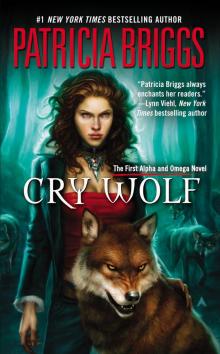 Cry Wolf
Cry Wolf On the Prowl
On the Prowl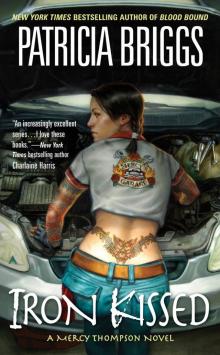 Iron Kissed
Iron Kissed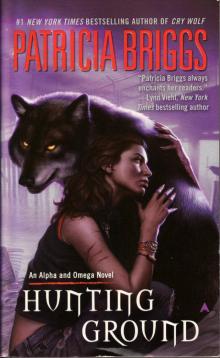 Hunting Ground
Hunting Ground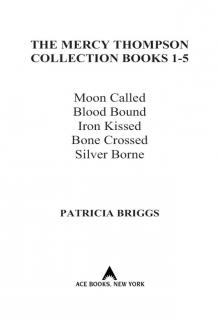 Patricia Briggs Mercy Thompson: Hopcross Jilly
Patricia Briggs Mercy Thompson: Hopcross Jilly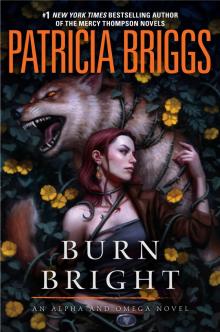 Burn Bright
Burn Bright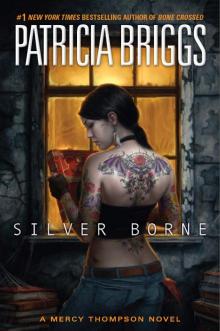 Silver Borne
Silver Borne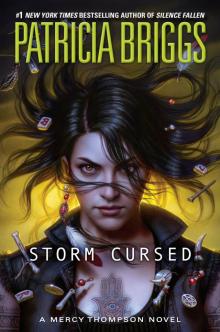 Storm Cursed
Storm Cursed Shifting Shadows
Shifting Shadows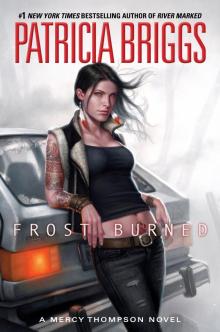 Frost Burned
Frost Burned River Marked
River Marked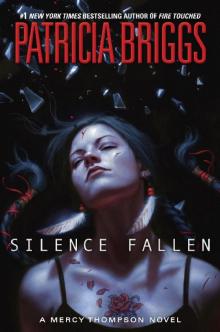 Silence Fallen
Silence Fallen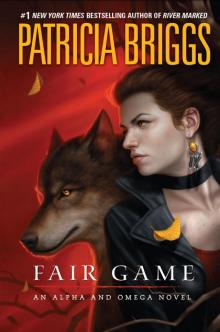 Fair Game
Fair Game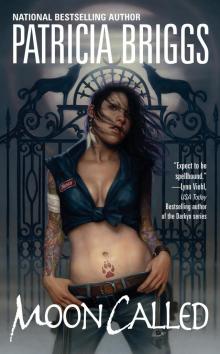 Moon Called
Moon Called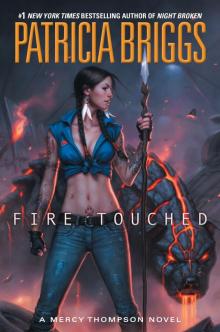 Fire Touched
Fire Touched Dead Heat
Dead Heat Blood Bound
Blood Bound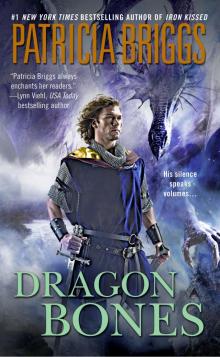 Dragon Bones
Dragon Bones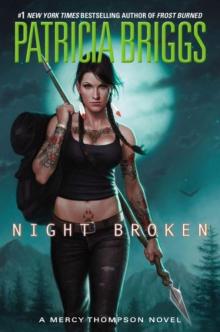 Night Broken
Night Broken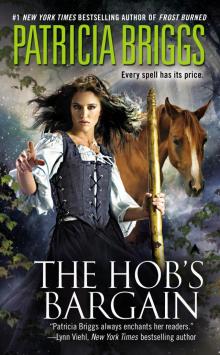 The Hobs Bargain
The Hobs Bargain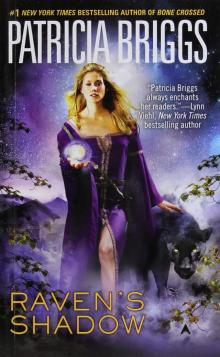 Ravens Shadow
Ravens Shadow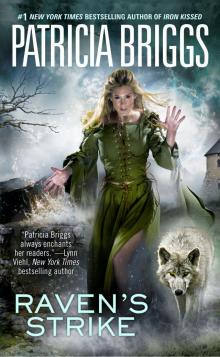 Ravens Strike
Ravens Strike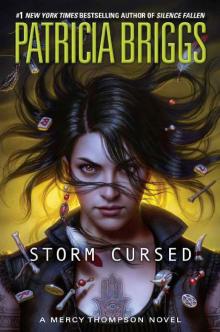 Storm Cursed (A Mercy Thompson Novel)
Storm Cursed (A Mercy Thompson Novel)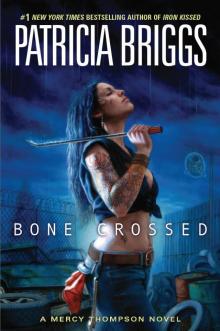 Bone Crossed
Bone Crossed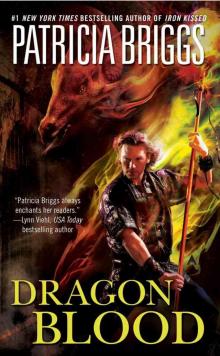 Dragon Blood
Dragon Blood Smoke Bitten: Mercy Thompson: Book 12
Smoke Bitten: Mercy Thompson: Book 12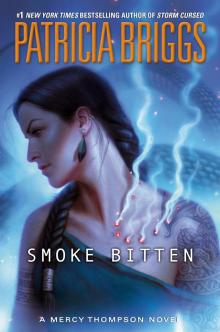 Smoke Bitten
Smoke Bitten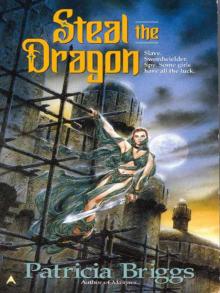 Steal the Dragon
Steal the Dragon 0.5 On The Prowl (alpha and omega)
0.5 On The Prowl (alpha and omega) Alpha and Omega
Alpha and Omega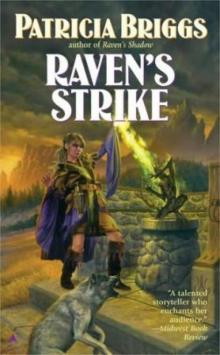 Raven's Strike rd-2
Raven's Strike rd-2![[Mercy 03] - Iron Kissed Read online](http://i1.bookreadfree.com/i/03/24/mercy_03_-_iron_kissed_preview.jpg) [Mercy 03] - Iron Kissed
[Mercy 03] - Iron Kissed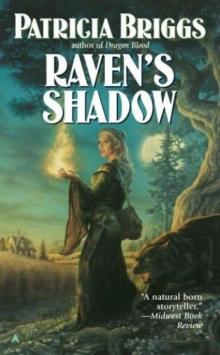 Raven's Shadow rd-1
Raven's Shadow rd-1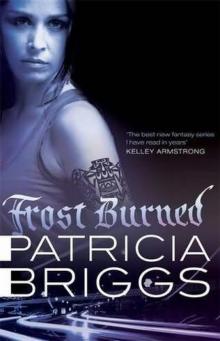 Frost Burned mt-7
Frost Burned mt-7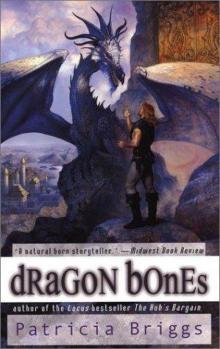 Dragon Bones h-1
Dragon Bones h-1 Shifting Shadows: Stories from the World of Mercy Thompson
Shifting Shadows: Stories from the World of Mercy Thompson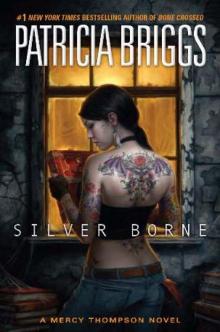 Silver Borne mt-5
Silver Borne mt-5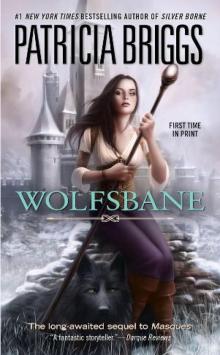 Wolfsbane s-2
Wolfsbane s-2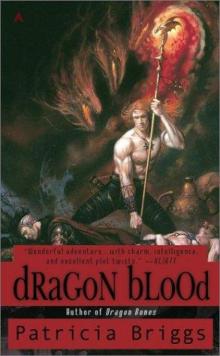 Dragon Blood h-2
Dragon Blood h-2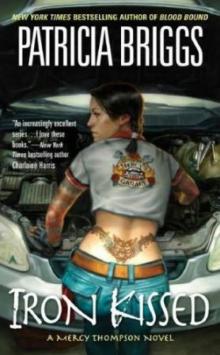 Iron Kissed mt-3
Iron Kissed mt-3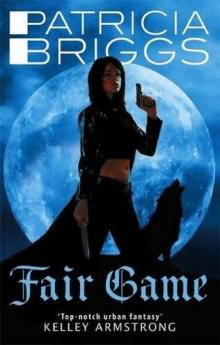 Fair Game aao-3
Fair Game aao-3 Masques s-1
Masques s-1![[Hurog 01] - Dragon Bones Read online](http://i1.bookreadfree.com/i1/04/03/hurog_01_-_dragon_bones_preview.jpg) [Hurog 01] - Dragon Bones
[Hurog 01] - Dragon Bones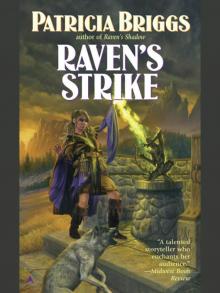 Raven s Strike
Raven s Strike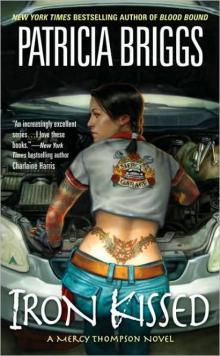 Mercedes Thompson 03: Iron Kissed
Mercedes Thompson 03: Iron Kissed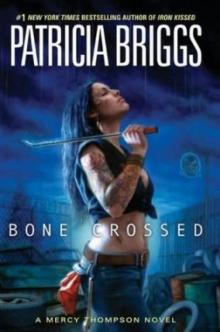 Bone Crossed mt-4
Bone Crossed mt-4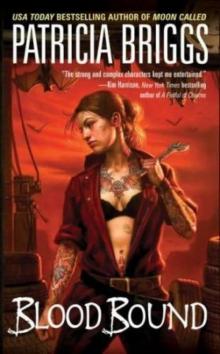 Blood Bound mt-2
Blood Bound mt-2![[Mercy 01] - Moon Called Read online](http://i1.bookreadfree.com/i2/04/09/mercy_01_-_moon_called_preview.jpg) [Mercy 01] - Moon Called
[Mercy 01] - Moon Called River Marked mt-6
River Marked mt-6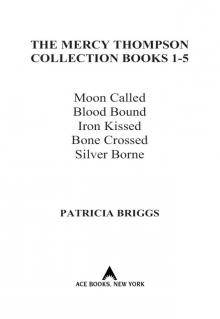 The Mercy Thompson Collection
The Mercy Thompson Collection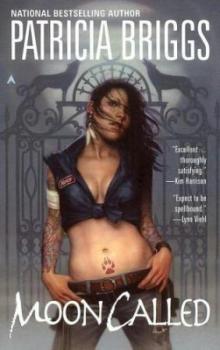 Moon Called mt-1
Moon Called mt-1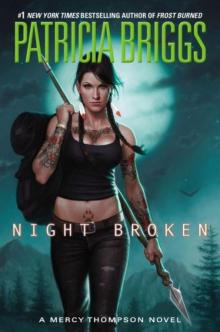 Mercy Thompson 8: Night Broken
Mercy Thompson 8: Night Broken